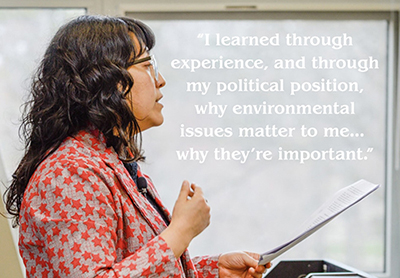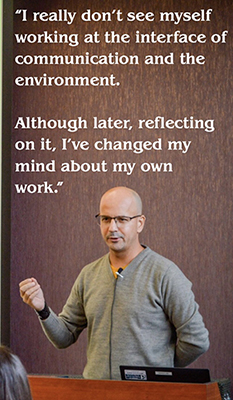BY ANNA BARNES, SHEALYN PAULIS

Symposium participants
From Mon. March 31, to Wed. April 2, 2025, Michigan State University’s Knight Center for Environmental Journalism and the Center for Latin American and Caribbean Studies (CLACS) hosted the Counter-Hegemonic Environmental Discourses in Latin American Contexts Symposium and Workshop. The event featured a full day of panels where visiting Latin American scholars representing eight countries presented their research on environmental communication.
Latin American perspectives are often marginalized from international academic spaces. Systematic barriers prevent researchers from being included in global conversations, such as language, translation difficulties and emphasis on work produced in the Global North. Additionally, the availability of funding is a stark contrast for academics in the Global South compared to their northern counterparts. These barriers have made scientific inclusion and cooperation between the Global North and South challenging.
The event highlighted research and scholarship from Latin America, with discussions centered on the communication of environmental health issues, sustainability, environmental journalism, and hegemonic perspectives. It also explored the audiences and sources of environmental communication, with particular attention to Indigenous and marginalized communities.

Dr. Karla Palma
Based in Ñuñoa, Chile, Dr. Karla Palma is an academic who researches the intersection between the environment, communication and disasters. Palma brought a unique perspective to the symposium as an Indigenous woman in the niche field of environmental communication. She said the intersection of her identities as Mapuche and Chilean makes her reflect on the environment in different contexts. Her perspective isn’t solely a Chilean or Mapuche perspective, but a blend of both that no other participant could offer.

Dr. Vilso Junior Chierentin Santi
Another participant, Dr. Vilso Junior Chierentin Santi is a professor and researcher at the Universidade Federal de Roraima in Boa Vista, Brazil. Prior to his arrival, Santi saw himself as a communicator and researcher, but said he had concerns that his work would not fit the niche ideas within the symposium. He explained that he did not see himself working within the intersection of environment and communication because all of his work is inherently environmental. Where he lives in Brazil, the Amazon region, all his communication work surrounds the natural world. Once he arrived at the event, he realized his research fit right in. His presentation included communication research that is inseparably environmental and left the symposium with a new outlook.

Dr. Pablo Gavirati
Dr. Pablo Gavirati works in cultural studies at the Gino Germani Research Institute and as a professor of Political Science at the Universidad de Buenos Aires. During his presentation, Dr. Gavirati discussed the intersection between cultural and indigenous communication methods and colonialism and how they shape environmental communication across Latin America. Additionally, he brought forth the topic of audiences and intentional use of communication tools. He provided his use of pop culture, such as anime and manga, to demonstrate environmental discourses as an example of communicating information to an intercultural audience. He emphasizes the use of intercultural perspectives, including those of Indigenous people, across environmental communication. He uses these tools to deconstruct and decenter eurocentric ideals that create the barriers communicators face in the Global South.

Dr. Victoria Gómez Márquez
Dr. Victoria Gómez Márquez is a researcher and scholar currently serving as Head of Research and Public Opinion at the School of Communication of the Universidad de Montevideo, Uruguay. She, too, has researched the connection between pop culture, communication, and audience perception, with her work focusing on environmental studies, including public attitudes, how audiences interpret sustainability messages, and the role of social media in shaping related discourse. Gómez Márquez brought forward discussion regarding the present hegemonic perspective and how it reinforces the obstacles communicators are actively working to overcome. She talked about reconstructing where academics seek citations, overcoming the hegemonic narrative that leads experts in Latin America to be overlooked in the search for scientific sources.
At the end of the symposium, the documentary“The Fly Back: Restoring Territorial Rights in the Ucayali Basin,” directed by attendee Dr. Reynaldo A. Morales was screened. Dr. Morales is originally from Peru and currently works as a professor and researcher at Northwestern University. Additionally, Dr. Morales is an appointed member of the UN indigenous media caucus. The documentary details many of the topics discussed throughout the symposium and workshop, such as indigenous perspectives and health impacts of environmental degradation.
Following the symposium, the researchers spent two days at a workshop developing collaborative research ideas. The two-day workshop resulted in thought-provoking conversations where the perspectives of participants, representing various countries and cultural identities, were considered. Together, they worked to come up with inclusive, actionable strategies to overcome some of the barriers identified throughout their presentations. Discussions of a collaborative mapping paper that covers the points of convergence and divergence in the field of environmental communication in Latin America are being discussed. Strengthening dialogues and creating forums for the researchers involved in the niche field will be a part of this collaboration.
The Counter-Hegemonic Environmental Discourses Symposium and Workshop at Michigan State University was more than just a gathering of international academics, it was a powerful step toward reshaping the environmental communication research landscape. By centering voices from Latin America and fostering genuine cross-cultural collaboration, the event highlighted the urgent need to break down hegemonic barriers and rethink how knowledge is produced, shared and valued. Above all, the event stressed that inclusive, sustainable and collaborative environmental communication globally is essential.
